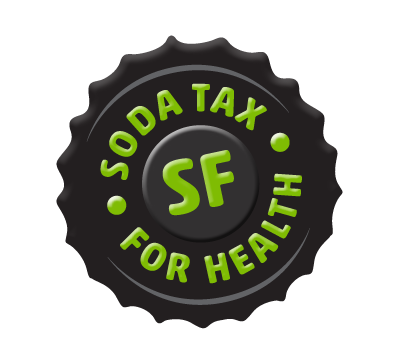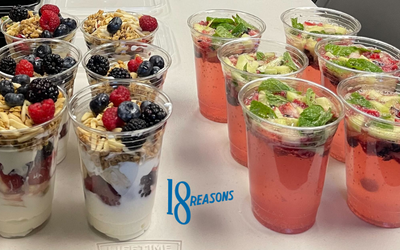By Sarah Nelson, Executive Director of 18 Reasons
18 Reasons’ cooking and nutrition education classes are made possible with funding by the 2020 Healthy Communities Grant.
Every week, 18 Reasons brings free cooking and nutrition classes to medical centers, schools, housing sites, and community organizations across San Francisco. Through these 6-week Cooking Matters series, we teach individuals and families to buy, cook, and eat good food on a limited budget.
Soda Tax funding is meant to support the communities most impacted by health disparities, and 18 Reasons delivers. The strength of our programming lies in partnerships. By working with organizations that already serve folks in under-invested neighborhoods, we’re able to bring Cooking Matters to the places most impactful for participants.
Each partnership and class series is unique – reflecting the resources and interests of each group of students. Fourth graders at Bret Harte Elementary in Bayview play amongst a school garden, before running inside for a fruit and vegetable taste test. North East Medical Center (NEMS) in Chinatown provides a nutritionist, support staff, and translators to offer culturally-relevant programming to seniors in Mandarin and Cantonese.
18 Reasons partners with ACCESS programs across San Francisco to support young adults with disabilities as they learn cooking and nutrition skills to last a lifetime. Participants at the SF AIDS Foundation learn nutritious recipes that can be made in a single room occupancy with a microwave or limited kitchen.
We know that participants are experts in their own lives, and that changing food and cooking habits is hard. Putting nutrition advice into practice – both at the grocery store and in the kitchen – requires confidence and creativity. The 18 Reasons curriculum highlights:
- Learning about nutrition labels, food groups, and balanced eating
- Vegetables, fruits, and whole grains – what are healthy and delicious choices
- Beverages and the importance of water
- Grocery store tour and shopping trip with the class
This adaptive curriculum doesn’t give one-size-fits-all advice – it encourages participants to tap into their own ingenuity, and make the best possible use of their food resources. Activities, hands-on practice, and peer-to-peer problem-solving are all part of nutrition lessons.
A favorite activity is the Sugar Shocker, where participants practice calculating the total teaspoons of sugar in a beverage. Spread out on the table are a variety of options: Gatorade, a Strawberry Kiwi Snapple, a can of Coke, a Jarritos, a small 100% fruit juice. By reading labels, participants calculate the grams of sugar in a drink, divide it by four to find the number of teaspoons, and count out teaspoon-equivalent sugar cubes to visualize the reality of added sugars.
The sugar is a shock: teens and adults alike express surprise at the sugar hidden in common products. They discuss deceptive marketing, and the way a fruity ‘Strawberry Kiwi’ and a post-workout drink both sound healthier than they are. Facilitated discussions around the benefits of water – and the difficulties we all have remembering to drink enough – spark resolutions to drink more of it.
The cooking portion of a class serves to reinforce the concepts learned in nutrition. Learning to make Citrus Berry Spa Water provides a bubbly, tasty, alternative to soda. Homemade Yogurt Parfaits avoid the added sugars prevalent in flavored yogurts. Desserts like Homemade Banana Bread and Tofu Chocolate Mousse are fun, delicious, and low in added sugar. Even better – all of these recipes are quick, nutritious, and low-cost.
In this way, knowledge is power. Through practical food skills education, 18 Reasons works to empower our community to make long lasting changes to the way we shop, cook, and eat.


